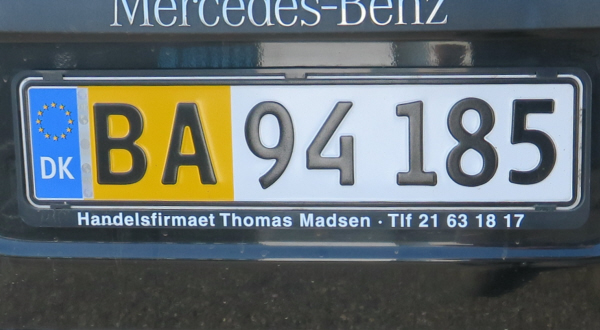Everything about a foreign car registry in Barcelona
In this article, we’ll guide you through the processes of importing a car from abroad, registering EU and non-EU vehicles, and exchanging foreign driver’s licenses in Spain.
Importing a car from a non-EU country could be a bit difficult and expensive, so before you do it we recommend you think twice. By the time you pay for shipping, customs, taxes, and other costs associated with the registry and the total sum reaches more than €4,000+, you will most likely realize it was easier to just buy a vehicle locally.
If this is not something that would stop you, we are here to help with this challenging process.
In order to import your car to Spain, you will need a Spanish driver’s license meaning you are a resident here.
For those who already have a valid non-EU license, you are legally allowed to drive with it during the first 6 months, it’s important that you have a translated international license on you during this time, once this period is expired a foreign license is no longer valid, you will need to exchange it to the Spanish one. Exchange agreements for driver’s licenses exist between Spain and the following countries: Switzerland, South Corea, Andorra, Japan, Bulgaria, Argentina, Colombia, Ecuador, Peru, Uruguay, Morocco, Chile, Algeria, Dominican Republic, Paraguay, Bolivia, Philippines, Guatemala, Brazil, Serbia, El Salvador, Turkey, Ukraine, Tunisia, Macedonia, Nicaragua, Monaco, Panama, Costa Rica. If you didn’t find your country on the list, you will need to take the full driver’s exams in order to get the Spanish license.
Importing an EU Vehicle

Taxes on vehicles from EU countries:
Imported used vehicles owned for more than 6 months prior to the owner becoming a resident in Spain are not subject to import duty as long as the VAT was paid in the EU country where the car was purchased.
A registry tax (Impuesto sobre determinados medios de transporte) is a tax based on engine capacity and it applies to both diesel and petrol engines and has to be paid on all cars in the local tax office (Agencia Tributaria).
- Cars of 2,000cc and less are taxed at 7%
- Other vehicles are taxed at 12%
When importing a new vehicle you will need to fill out a 565 form at Spanish Customs Offices and pay 16% VAT at any bank that collaborates with the Tax Office (they will give you the list).
Registering vehicles from another EU country:
The list of documents to be submitted to the Traffic Department:

- An application form
- NIE
- ID card (residence card or passport; original and photocopies suggested)
- Proof of address (empadronamiento)
- Receipt of payment of local car tax (impuesto municipal sobre vehículos de tracción mecánica/IVTM) from the local town hall or Traffic Department
- Receipt of payment of registration tax (impuesto especial sobre determinados medios de transporte), original and photocopy
- Registration document (Permiso de Circulación y Permiso Para Conducción)
- Proof that VAT (IVA) has been paid in the country of purchase (original and photocopy)
- Technical Test Certificate Card (Tarjeta de Inspección Técnica – see below) obtainable from an ITV station (original and photocopy)
- Vehicle purchase receipt (original and photocopy)
- Certificate of Conformity (Certificado de Conformidad) from the vehicle manufacturer or a certified representative (original and photocopy)
- If applicable, declaration of ownership of other Spanish-registered vehicles
- If applicable, declaration of possession of a Spanish driving license
- If the vehicle is from the Netherlands, Form RDW 323 (available from the local Traffic Department)
EU citizens who are not Spanish residents can drive their (foreign-registered) vehicles in Spain for up to 180 days in a calendar year. After the 180 days have elapsed, you can keep it as long as you don’t drive it. Even though EU citizens are no longer required to obtain Spanish residency, after 182 days the vehicle must be either registered in Spain or garaged.
Importing a non-EU Vehicle:

If you are interested in bringing your car from abroad we strongly recommend you to use professional help to smooth the process. Delonix Agency’s trusted legal representatives will be happy to help you in this journey.
Be aware, though, that even with the help of our best professionals, there is a chance that your car will not be able to be made “homologación” (compliant with European standards). The most common problem is the fitting of new headlights. The problem is mainly that no one makes them for your car. Many expats have been halted by this issue and have ended up with a useless car in the parking lot that has cost them almost as much as the car itself to import.
ITV Certificate (Technical Test Certificate Card)
Prior to registering your vehicle in Spain, your car will need to pass an official control inspection (Inspección Técnica de Vehículos) at an ITV station. Inspections are usually made by appointment.
Passing ITV test for new vehicles:
The documents needed:
- Purchase receipt (original and photocopy)
- The vehicle’s technical specifications (provided by the vehicle manufacturer or representative) as well as a Spanish translation
- Receipt of payment of duty (original and photocopy)
- Unic Certificate (Certificado Unico or Certificado de Adeudo), obtainable from the Traffic Department
Note: The Unic Certificate is not necessary for vehicles coming from EU countries
Passing ITV test for Used Vehicles:
- The vehicle’s technical specifications (provided by the vehicle manufacturer or representative) with a Spanish translation
- Receipt of payment of duty (original and photocopy)
- Purchase receipt (original and photocopy)
- Vehicle registration documents
Classic cars (históricos) require a special control test (Inspección Técnica de Vehículos) as well as an authenticity certificate from the regional government (comunidad autónoma).
Once the vehicle passes the ITV test, a Technical Test Certificate Card (Tarjeta de Inspección Técnica) will be issued.

We hope this article answered most of your questions, if you are still interested in learning more about it or would like us to assist you with the car registry please don’t hesitate to contact us.

